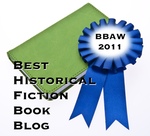 On her search for a harpsichord, Madeline Goold comes across a square piano in an antique sale. While not playable, it’s in surprisingly good condition, and after taking note of its serial number, 10651, she sends it off for repair and decides to find out who owned it. Her search leads to a delightful and sometimes sad history of the Langshaw organists, father and son, as well as of Broadwood pianos in general and the effect the square piano had on music for the English public.
On her search for a harpsichord, Madeline Goold comes across a square piano in an antique sale. While not playable, it’s in surprisingly good condition, and after taking note of its serial number, 10651, she sends it off for repair and decides to find out who owned it. Her search leads to a delightful and sometimes sad history of the Langshaw organists, father and son, as well as of Broadwood pianos in general and the effect the square piano had on music for the English public.
I didn’t expect much from this book, but it really was fascinating. Goold’s 1807 square piano leads her to a goldmine of information. I know very little about the history of the piano, and she comfortably filled in the blanks and provides a great bibliography for further information. I love it when historians use a small detail to examine the wider history, and that’s precisely what Goold does here. She links successfully the buyer of her square piano, Mr. John Langshaw, with the Broadwood family and their history of harpsichord and then piano making, and further expands to cover the transition from harpsichords to fortepianos and what it did to music. All of it was fascinating.
The most interesting section for me was about the Langshaw family. The elder Mr. Langshaw was disabled and thus forced to choose a different career than his father. He chose music and became a moderately successful organist, at least successful enough to educate his children, particularly his oldest son John. John followed in his father’s footsteps to become an organist, but he also had links with London and may have met the Broadwoods, from whom he commissions pianos for clients in his area. She uses copious quotes from letters to establish his history, and as such it’s almost as though I got a peek into his mind. Their family story is not always cheerful, and the piano was probably not even for them, but Goold speculates to some extent in this direction. She acknowledges that we’ll never know the answer because the relevant records have been destroyed, but her ideas are nonetheless intriguing and plausible.
Goold also links the history with well-known composers and even uses comparisons with Jane Austen to demonstrate the importance of the piano. Cheaper pianos meant newly emerging middle class families could buy the basic models, and piano playing became an important skill for young women, even if they were never permitted to play for public audiences. I loved the way she used the piano to explore the entire culture.
I suppose the only thing that keeps this book from being perfect are the few sections in which Goold attempts to fictionalize various aspects of the Langshaws’ life. She’s not a fiction writer and these few sections, italicized to separate them from the main body of the text, make that very clear. I have to say I skipped over them after the first few, because her regular writing is much smoother and the facts were much more interesting for me than her attempts to picture the scenes.
Mr. Langshaw’s Square Piano is a very interesting little book and I would highly recommend it to anyone interested in the history of music or Jane Austen’s England. I had a great time reading it.
I am an Amazon Associate. I received this book for free from a publicist for review.









What an interesting premise. I’m not sure I understand why there needed to be fictional parts, but this book sounds like a treat. Thanks for putting it on my radar.
.-= Julie P.´s last blog ..Book Club Exchange – Michele Scott & Giveaway =-.
This sounds much better than I was expecting it to be! I need to dig it out of my TBR pile and read it.
I’m always up for piano-related fiction! I’ll give it a look.
.-= Pete´s last blog ..Some Instruments Have It Tougher Than Piano =-.
The title grabbed me immediately. I’m glad that it’s overall an enjoyable book. I’ll have to get a hold of a copy.
I love books like this–where an object reveals a whole story or history. Very art historical, actually! This book sounds fascinating.
.-= heidenkind´s last blog ..Persuasion by Jane Austen =-.
I’d not heard of this book, but it does seem like something that I would enjoy reading. I liked your review on this one and am glad that you enjoyed the book. I will have to take a closer look at it.
.-= zibilee´s last blog ..If You Follow Me by Malena Watrous – 384 pgs =-.
Thanks for the review. I hadn’t heard of this book prior to reading this, but from your explanation, it seems that it would deffinatley something I would like to read. I think it will support my interest in music, and especially the piano.
The book was reviewed at a meeting of a music club of which I am a member. We found it very interesting, especially how it changed social culture of England.